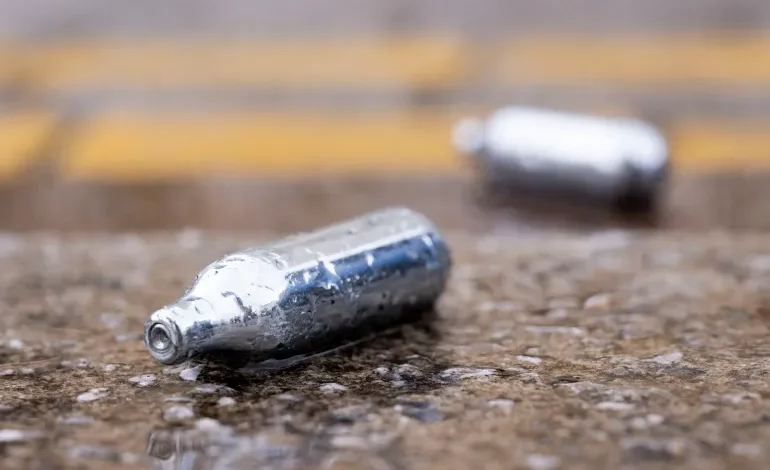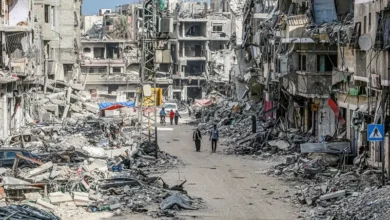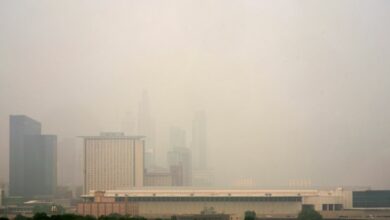In Nigeria, youths seek ‘happy hours’ in laughing gas amid economic woes

One evening in July 2020, Seun [last name withheld], wearing his favourite vintage shirt, a baseball cap and sneakers, boarded a minibus from his home in Mushin to celebrate his 28th birthday with friends at Eleko beach in Lagos.
Midway between the drinks at the party, one friend brought out some balloons from a bag and a blue canister to inflate them. Soon, the entire group was sniffing the balloons.
Laughing gas abuse is not just a Nigerian problem; usage has been reported in Denmark, the Netherlands and France, just as the United Kingdom has mulled a ban on it. In June, the NDLEA announced a crackdown on marketers and users of laughing gas in the country.
Stella Iwuagwu, executive director of the Centre for the Right to Health, a Lagos-based NGO campaigning against substance abuse in schools, blames the surge partly on a new moral code in which youngsters consider it cool to be filmed or appear in live videos using drugs and other banned substances.
But it is mostly due to frustration with the state of Nigeria, she said. Just three years ago, during Nigeria’s second recession in as many years, the naira exchanged at an average of 380 to $1; today, the naira has fallen to a third of that. A cost-of-living crisis has also hit Africa’s largest economy, as reforms by a new administration stutter and push the price of basic commodities above the reach of millions.
A series of policy missteps has also led to the exit of several foreign companies and the collapse of a number of local ones, keeping as many as a third of the population jobless.
“There is a lot of pain and frustration and people take drugs to quench the pain they are feeling,” Iwuagwu said. “Drug is their escape from hopelessness.”
An expensive habit
The morning after his birthday, Seun’s friends showed him clips of his misdemeanour. Their mocking singed his ego so bad that he asked for another balloon, to redeem himself.
“They were laughing at me that I spoilt my birthday by myself so I had to do it again to let them know my street credibility is intact,” he told Al Jazeera.
But laughing gas is expensive, and neither he nor any of his friends make enough money to cater for their needs. A canister costs about 100,000 naira ($124), equivalent to the monthly salary for Seun, a computer technician in Ikeja and breadwinner for his wife and daughter.
Still, once every two weeks, he would pool resources with three or four friends to get a canister from their supplier, Pablo, who makes deliveries with his car. They hole up in a room and play loud music, each holding a balloon. Sometimes, they’d fill up one balloon and pass it around to be inhaled.
While Seun also takes other substances like rohypnol (or rephnol), codeine and molly (MDMA or ecstasy), he says he prefers laughing gas because of the extreme escape it provides.
Unlike other drugs, laughing gas does not have its own colloquial name yet, mostly because it is expensive and has not become wildly popular among low-income users, who still get by on cheaper gateway drugs.
“All of these other drugs used to be very expensive but when they get more popular and become cheaper,” another user Abidemi [last name withheld] said, predicting a similar future for laughing gas.
In August, Arit Esangbedo was called to see a patient suffering from a cardiac arrest but she was unable to make an assessment until the patient’s friends confessed he had overdosed on nitrous oxide. It was her first experience dealing with a case of overdose on nitrous oxide.
“He was unconscious … when I examined him, I didn’t see the classic opioid overdose signs and symptoms,” she said. “It was when I started asking questions from his friends that I was told that he finished a canister of nitrous oxide alone.”
Esangbedo, a consultant psychiatrist at the addiction unit of the Federal Neuropsychiatric Hospital, Yaba, managed to resuscitate him. Since then, there have been more cases, with four people brought in with seizures and in hallucinatory fits. But not everyone has been so lucky – in other cases, five youths died due to overdose.
“People fail to understand that it is not all substance they can use … but people who are looking for this high are ready to do anything and before you know what is happening, the person is gone,” she said.
Juwon Afolayan, a resident doctor at the anaesthesia department of the Lagos State University Teaching Hospital, says clinical use of nitrous oxide is declining because of side-effects on patients such as disorientation and impaired memory. The substance, he adds, has become highly regulated in Nigeria because it can be used to make explosives.
Still, its suppliers have managed to find ways to distribute it.
The doctors say during clinical use, they administered oxygen to patients side by side with nitrous oxide to help wear off the effect of the latter. But recreational users of nitrous oxide do it solo and so feel the side-effects of the compound more, they added.










